

Une femme à la tête d'une banque - ARABIE SAOUDITE. Fawza Falih. Fawza Falih Muhammad Ali was a Saudi woman who made international headlines after she was condemned to death for practicing witchcraft in 2006.[1] In April 2011, Saudi authorities reported that she had died in 2010.[2] In a letter dated February 13, 2008, Christoph Wilcke, a researcher with Human Rights Watch, exhorted King Abdullah bin Abdul Aziz Al Saud to halt her execution.
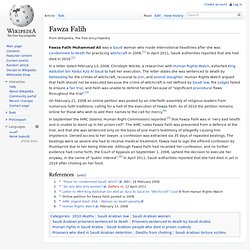
The letter states she was sentenced to death by beheading for the crimes of witchcraft, recourse to jinn, and animal slaughter. Human Rights Watch argued that Falih should not be executed because the crime of witchcraft is not defined by Saudi law, the judges failed to ensure a fair trial, and Falih was unable to defend herself because of "significant procedural flaws throughout the trial".[3] On February 21, 2008 an online petition was posted by an interfaith assembly of religious leaders from numerous faith traditions, calling for a halt of the execution of Fawza Falih. Saudi survey shows men blame women for rising cases of molestation. Saudi men believe women are to blame for the rising cases involving molestation of females on the grounds they are seduced by women’s excessive make up.
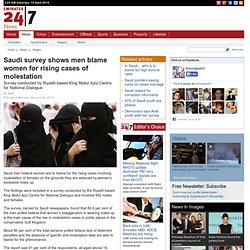
The findings were included in a survey conducted by the Riyadh-based King Abdul Aziz Centre for National Dialogue and involved 992 males and females. The survey, carried by Saudi newspapers, found that 86.5 per cent of the men polled believe that women’s exaggeration in wearing make-up is the main cause of the rise in molestation cases in public places in the conservative Gulf Kingdom. About 80 per cent of the total persons polled believe lack of deterrent penalties and the absence of specific anti-molestation laws are also to blame for the phenomenon. The report said 91 per cent of the respondents, all aged above 19, believe another key factor is the “poor religious sentiment” while nearly 75 per cent said the problem is caused by lack of awareness campaigns and warning notices at most public places.
Arabie saoudite : il faut autoriser les femmes à conduire. Nouvelle campagne pour mettre fin à l’interdiction de conduire © October 26th Women Driving Campaign Eman Al Nafjan (@Saudiwoman) est une blogueuse saoudienne qui se mobilise contre l’interdiction de conduire imposée aux femmes dans son pays.
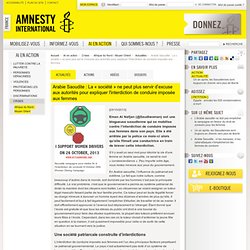
Elle a été arrêtée par la police ce mois-ci alors qu’elle filmait une conductrice en train de braver cette interdiction. S’il y avait un seul mot pour décrire la vie d'une femme en Arabie saoudite, ce serait le mot « condescendance ». Peu importe votre âge, vous restez mineure aux yeux du gouvernement. En Arabie saoudite, l’influence du patriarcat est extrême. Une société patriarcale construite d’interdictions. Quand l'Arabie saoudite traque les femmes par SMS - ARABIE SAOUDITE. Une Saoudienne domine l’Everest et entre dans l'histoire - ALPINISME. Des Saoudiennes à l'Assemblée : "Une avancée significative mais symbolique" - ARABIE SAOUDITE.
Saudi woman driver freed after agreeing to quit campaign. Manal al-Sharif on the road in Saudi Arabia Link to video: Saudi woman driver faces jail again - 'This is against religion and logic' A Saudi Arabian woman who was jailed for driving a car has been released after nine days, having pledged to take no further part in a campaign to persuade the Saudi authorities to allow women to drive.
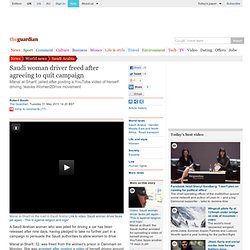
Manal al-Sharif, 32, was freed from the women's prison in Dammam on Monday. She was arrested after posting a video of herself driving around the eastern city of Khobar as part of the Women2Drive campaign of which she was a key organiser. Her case attracted international attention after her lawyer said she had been charged with driving without a licence, prompting other women to do the same and provoking public debate in Saudi Arabia. Two other women associated with the campaign were also questioned by police and warned off further campaigning. He said the authorities had not imposed the conditions, but Sharif had decided to make the pledge herself. Les Saoudiennes autorisées à faire du sport dans les écoles privées - ARABIE SAOUDITE. Saudi Arabia lifts ban on women riding bicycles. Women in Saudi Arabia are still banned from driving cars (among other things), but the kingdom’s religious police are now allowing them to ride motorbikes and bicycles in certain parks and recreational areas.
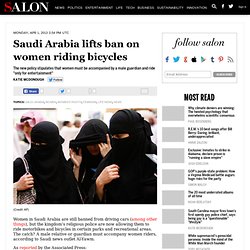
The catch? A male relative or guardian must accompany women riders, according to Saudi news outlet Al-Yawm. As reported by the Associated Press: The Al-Yawm daily on Monday cited an unnamed official from the powerful religious police as saying women can ride bikes in parks and recreational areas but they have to be accompanied by a male relative and dressed in the full Islamic head-to-toe abaya. Saudi Arabia follows an ultraconservative interpretation of Islam and bans women from driving. The lift on the bicycle riding ban is one of several recent nods to women’s empowerment in Saudi Arabia.
PHOTO. Voici la première campagne contre les violences conjugales faites aux femmes en Arabie Saoudite. ARABIE SAOUDITE - Le royaume d'Arabie Saoudite a publié sa première campagne de publicité contre les violences domestiques.

Cette publicité montre une femme portant un hijab laissant voir seulement ses yeux dont l'un est au beurre noir. La photo est accompagnée du slogan : "Certaines choses ne peuvent pas être couvertes - Combattons ensemble les violences faites aux femmes. " En Arabie saoudite, battre sa femme n'est plus légal - ARABIE SAOUDITE. Saudi police 'stopped' fire rescue. Saudi Arabia's religious police stopped schoolgirls from leaving a blazing building because they were not wearing correct Islamic dress, according to Saudi newspapers.
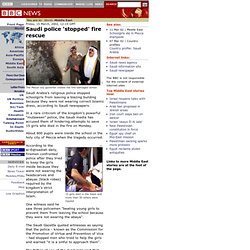
In a rare criticism of the kingdom's powerful "mutaween" police, the Saudi media has accused them of hindering attempts to save 15 girls who died in the fire on Monday. About 800 pupils were inside the school in the holy city of Mecca when the tragedy occurred. According to the al-Eqtisadiah daily, firemen confronted police after they tried to keep the girls inside because they were not wearing the headscarves and abayas (black robes) required by the kingdom's strict interpretation of Islam. One witness said he saw three policemen "beating young girls to prevent them from leaving the school because they were not wearing the abaya". The father of one of the dead girls said that the school watchman even refused to open the gates to let the girls out. Relatives' anger Families of the victims have been incensed over the deaths. Un Saoudien incite ses 97.000 followers à agresser sexuellement les femmes qui travaillent.
INTERNATIONAL - Écrivain de livres sur le développement personnel et religieux connu en Arabie Saoudite , Abdullah Mohammed Daoud a incité ses 97.000 followers sur Twitter à agresser sexuellement les femmes du pays qui travaillaient aux caisses des supermarchés. En utilisant un mot-clé traduit par de nombreux médias anglo-saxons par #harass_female_cashiers (#harcelez_femmes_caissières), Abdullah Mohammed Daoud aurait tenté, à l'aide de ses commentaires, d'"encourager" les femmes saoudiennes -de plus en plus nombreuses à travailler- à rester chez elles et à protéger leur chasteté. "Il n'y a pas d'endroit plus sûr que chez soi" Un Saoudien qui a violé, torturé et tué sa fille libéré après avoir payé le «prix du sang»